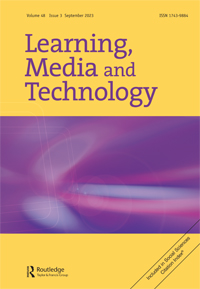反馈循环问题化:mooc中的“on”、“with”和“beyond”分析仪表板
IF 3.1
1区 教育学
Q1 EDUCATION & EDUCATIONAL RESEARCH
引用次数: 0
摘要
摘要本文研究了大规模在线开放课程(MOOCs)中反馈的制定,重点是分析仪表板。在认识到数据实践是纠缠和“混乱”的学术基础上,本文提出了反馈循环模型的问题,该模型假设分析仪表板通过单一的数据处理流程将数据“反馈”给教师和/或学习者。通过对两所大学和两个平台上的四所mooc进行实证研究,论文描绘了设计团队、教师和学习者在何时、何地以及如何通过分析仪表板制定反馈。研究结果利用可视化技术,突出了人与技术之间的复杂关系,其中包括多个“循环”。论文最后质疑了在单一循环中获取反馈的必要性,并建议优先关注mooc中人们(教育设计师、教师和学习者)的角色和责任。我们要感谢爱丁堡大学在线课程制作服务的Lizzy Garner-Foy、Rachael Mfoafo和其他成员,以及鲁汶大学MOOC团队的Lien Castelein、Elke Van der Stappen、Jeroen Buntinx和Kenny Verbeke的贡献。我们还要感谢“啤酒:酿造科学”和“可持续商业模式”的讲师,包括Casper Van Cleemput,以及“气候解决方案”的讲师:Dave Reay和Erika Warnatzsch。此外,我们还要感谢Carol Lewis、Richard Nyoni、魏文阳、Ines Kadangwe和Alina Liapota等学员。最后但并非最不重要的是,非常感谢学习者,教师和工作人员的匿名贡献。披露声明作者未报告潜在的利益冲突。本研究由佛兰德斯研究基金会(FWO)资助,基金号为K208722N。本文章由计算机程序翻译,如有差异,请以英文原文为准。
Problematizing feedback loops: ‘on’, ‘with’, and ‘beyond’ analytics dashboards in MOOCs
ABSTRACTThis paper examines the enactment of feedback in Massive Open Online Courses (MOOCs), focusing on analytics dashboards. Building on scholarship that recognizes data practices as entangled and ‘messy’, the paper problematizes the model of the feedback loop that assumes that analytics dashboards ‘feed back’ data to instructors and/or learners through a singular flow of data processing. By setting out an empirical study that focuses on four MOOCs, in two universities and on two platforms, the paper maps where, when, and how design teams, instructors, and learners are involved in the enactment of feedback through and beyond analytics dashboards. The findings draw on visualizations that highlight complex relations among people and technologies, which include multiple ‘loops’. The paper concludes with questioning the need to capture feedback in a singular loop and suggests prioritizing continued attention to the roles and responsibilities of people – educational designers, instructors, and learners – in MOOCs.KEYWORDS: Analytics dashboardsfeedbackMOOCstopologydata infrastructures AcknowledgmentsWe want to thank Lizzy Garner-Foy, Rachael Mfoafo, and other members of the Online Course Production Service at the University of Edinburgh, and Lien Castelein, Elke Van der Stappen, Jeroen Buntinx, and Kenny Verbeke of the MOOC Team at the KU Leuven for their contributions. We would also like to thank the instructors of ‘Beer: The Science of Brewing’ and ‘Sustainable Business Models’, including Casper Van Cleemput, and the instructors of ‘Climate Solutions’: Dave Reay and Erika Warnatzsch. Furthermore, we would like to thank the learners, including Carol Lewis, Richard Nyoni, Wei Wenyang, Ines Kadangwe, and Alina Liapota. Last but not least, a big thanks to the anonymous contributions of learners, instructors, and staff members.Disclosure statementNo potential conflict of interest was reported by the author(s).Additional informationFundingThis work was supported by the Research Foundation Flanders (FWO) under Grant K208722N.
求助全文
通过发布文献求助,成功后即可免费获取论文全文。
去求助
来源期刊

Learning Media and Technology
EDUCATION & EDUCATIONAL RESEARCH-
CiteScore
11.40
自引率
14.50%
发文量
53
期刊介绍:
Learning, Media and Technology aims to stimulate debate on digital media, digital technology and digital cultures in education. The journal seeks to include submissions that take a critical approach towards all aspects of education and learning, digital media and digital technology - primarily from the perspective of the social sciences, humanities and arts. The journal has a long heritage in the areas of media education, media and cultural studies, film and television, communications studies, design studies and general education studies. As such, Learning, Media and Technology is not a generic ‘Ed Tech’ journal. We are not looking to publish context-free studies of individual technologies in individual institutional settings, ‘how-to’ guides for the practical use of technologies in the classroom, or speculation on the future potential of technology in education. Instead we invite submissions which build on contemporary debates such as: -The ways in which digital media interact with learning environments, educational institutions and educational cultures -The changing nature of knowledge, learning and pedagogy in the digital age -Digital media production, consumption and creativity in educational contexts -How digital media are shaping (and being shaped by) educational practices in local, national and global contexts -The social, cultural, economic and political nature of educational media and technology -The ways in which digital media in education interact with issues of democracy and equity, social justice and public good. Learning, Media and Technology analyses such questions from a global, interdisciplinary perspective in contributions of the very highest quality from scholars and practitioners in the social sciences, communication and media studies, cultural studies, philosophy, history as well as in the information and computer sciences.
 求助内容:
求助内容: 应助结果提醒方式:
应助结果提醒方式:


